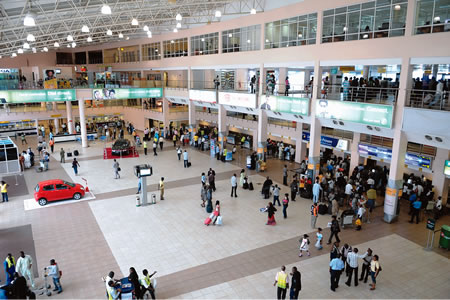AS long as there continues to be the business of human and cargo movements around the world through airports with the use of aircraft manufactured by man and other human interfaces, air transport will continue to experience some challenges. Top of such hiccups is the issue of flight cancellations and delays.
Obviously, since the problem of flight delays and cancellations are global in nature, they are therefore, not peculiar to Nigerian airlines and the aviation sector. Therefore, when cancellations or delays happen, as frustrating as it may be to passengers who are always at the receiving end, there is the need for all relevant stakeholders not to jump to conclusions.
The level at which domestic airlines either delay or cancel flights nowadays is becoming alarming. But before they are condemned for this, there is the need to look into the factors responsible.
Police detain COZA pastor, Biodun Fatoyinbo, at force…
Reasons airlines cancel or delay flights
Many reasons which could be responsible for flight delays and cancellations include:
Inclement weather, which is the number one reason for airline flight cancellations and delays; after all, who wants to be flying through a major thunderstorm? A plane being grounded because of weather happens for reasons of safety. Uncooperative weather can range from snow storms and hurricanes, to fog, strong winds, or even because it’s too hot to fly as aircraft are unable to work when the temperature becomes extremely high.
While airlines often cancel flights in anticipation of bad weather, no airline wants to leave passengers stranded but the general industry standard is that it is better to inconvenience travelers at their point of origin than having a sky full of planes that can’t land due to weather.
Mechanical issues have also been found to be a major reason airlines do cancel or delay flights. A cancellation due to mechanical issues can mean your aircraft is broken down and needs to be repaired; or it could be as a result of hydraulic leak, a faulty engine, or perhaps a door that falls off its hinges.
Because there’s too much at risk to fly a plane that is faulty, every part of the plane needs to be in perfect condition for the flight. Some issues can be resolved quickly. While other mechanical problems might take several hours (or longer) to repair. Ideally, you’ll only be delayed for a short amount of time while a replacement part is brought in and the aeroplane is fixed, or switched to another flight but often, this may be cause to cancel the flight.
Air traffic delays can lead to flight delay due to VIP movements, landings/takeoffs, heavy air traffic from other airports.
Security threats at the airport or aboard aircraft often leads to flight delays or outright cancellation. Airline security these days is taken seriously. Therefore, when it comes to security, airlines shouldn’t take any risks.
If there is a genuine concern around the security of the flight, the plane will be grounded or flight delayed as witnessed in the recent breach of security at the Lagos airport where one Usman Adamu, a citizen of the Republic of Niger, was seen crawling out of an aircraft engine belonging to Azman airline, and proceeded to climb on its wing thus creating commotion. Facilities in some of the airports today are not helping flight operations as witnessed in the state of some runways that easily get waterlogged during rainfalls.
Domestic reasons
While the reasons stated above for flight delays and cancellations are not peculiar to Nigerian airlines, there are unfortunately some domesticated problems contributing to the menace which cannot be blamed on the airlines entirely. Such locally induced factors include: shortage in supply and exorbitant price of aviation fuel, VIP movements, animals crossing runway or tarmac and other infrastructural deficiencies at the airports.
The high level of infrastructural deficiencies already taking its toll on facilities in most of the airports are contributory factors to the delays and cancellations of flights at Nigerian airports.
It is very common to hear how runways are waterlogged during rainfalls leading to the disruption of flights or how flight operations into some airports end 6pm due to absence of instrument flight aids or inadequate screening machines, among several others.
Airlines speak
Attesting to the infrastructural problems and its effects on domestic airline business, many at times, the domestic airlines under their umbrella body, the Airline Operators of Nigeria (AON), through their chairman, Captain Nogie Meggison had lamented inadequate terminal facilities hindering 24 hours operation; he said the Federal Airports Authority of Nigeria (FAAN) had a serious role to play.
As a result of the infrastructural challenges, Meggison declared that domestic airlines lose up to N20 billion annually to flight cancellations.
In line with the AON chairman, the chairman of Air Peace Airline, Mr Allen Onyema had attested to the fact that poor airport infrastructure contributes to flight delays as over 1,000 passengers sometimes have to use one security screening point.
For Dana Air’s Accountable Manager, Obi Mbanuzuo, flight delays are due to inadequate infrastructure. “We go through day to day operational challenges . In some airports the landing facilities are not there for 24 hours . That is why airlines either delay or cancel flights,” he said.
Passengers’ reaction
Without doubt, passengers have continued to be at the receiving end of the too many late departures and cancellations. There is nothing as frustrating as having your flight delayed or cancelled after you have mapped out plans to catch up with an appointment. Whenever this happens, passengers don’t spare airlines to the extent that any airline staff available at the time may be physically attacked.
No wonder it has become a normal sight to behold at the airports angry passengers reacting to flight cancellations or delays by physically attacking innocent workers to express their grievances without caring to know the factors responsible for such.
Such passengers often take their action too far in that they damage property belonging to the airline and even government. But unknown to the aggrieved passengers, there are more to that flight delayed or cancelled in view of the different components that make up a complete safe flight.
Air Peace airlines has been adjudged to be on top of airlines whose workers had been physically assaulted due to flight delays or cancellation. This has been attributed to the fact that it is the largest airline with the largest number of routes which cut across the country. Despite the number of the aircraft in its fleet, the airline is still battling with flight delays and cancellations due mainly to poor infrastructure at the airports.
Many passengers often do not realise that no airline owner that is worth their salt will deliberately cancel or delay flights despite the consequences awaiting the decision.
Implications of canceling flights or delaying flights recklessly include: loss of public confidence, loss of money, bad image, low patronage, fines, and being in the bad book of the aviation regulatory body. In the face of these identified reasons, it is only reasonable for any airline that will not want to compromise safety of passengers to choose to either delay or cancel such flights rather than endanger lives.
Flight delays/cancellations in three months
According to the latest statistics released by the Consumer Protection Department of the Nigerian Civil Aviation Authority (NCAA), the sector in the first quarter of this year for example recorded 7,926 cases of delayed flights which represented more than 50 per cent of the flights within the period under review.
Air Peace being the largest carrier with its fleet and number of routes it flies into, having operated 5,768 flights, recorded the highest number of delayed flights with 3,058 and 66 cancellations, while Arik Air followed with 1,376 delayed flights, 32 cancellations out of its 3,001 flight operations.
Aero operated 1,535 flights with 951 delayed and 31 cancelled while Azman Air recorded 637 delays and eight cancellations out of the 1,301 flights operated.
Also, Dana Air operated 919 flights with 587 delays and 25 cancellations; Overland, 612 flights with 421 delays and six cancellations.
The rest are Max Air, which operated 1,416 flights with 810 delays and four cancellations as well as Medview, which operated 183 flights with 112 delayed and nine cancelled.
The good thing is that the regulatory agency recognised the facts that most of the cancellations and delays were not deliberate.
Speaking on this in a brief chat with the Nigerian Tribune, the spokesperson of the NCAA, Sam Adurogboye while agreeing that “some delays and cancellations are sometimes brought about by safety related issues such as unforeseen technical problem, some could be on account of bad weather. On this score, we will support the airline operators. However, some could also arise from poor load factors or infrastructural challenges.”
Why airlines should not be sacrificed:
According to Mr Peter Adewale who described himself as a regular traveler, it will be unfair to blame the airlines for all the problems that have to do with flight delays or cancellations on the domestic scene. While agreeing that the airlines definitely have their own self made problems, he however, traced the delays and cancellations to everything that goes wrong in the sector. Though the domestic airlines have their shortcomings, he said, the problems may continue until the Federal Airports Authority of Nigeria (FAAN) attends to infrastructural gaps at most of the airports. He explained that while weather-related delays are inevitable, more airports with longer hours of operations and night services will help the airlines operate more efficiently and on time. Rather than lay the entire blame on the desk of the airlines, stakeholders have pushed the major part of the factors militating against on time departure and cancellations on airport obsolete infrastructure slowing down the capacity of the domestic airlines. The domestic airlines some months ago had blamed their inability to operate their flight services normally due to poor visibility on obsolete navigational aids at the nation’s airports. According to the airlines, Nigeria still operates category 1 visibility, also known as CAT One with 800 meters, while most airports around the world operate CAT lll and land in zero visibility. At a forum, attended by 13 international airlines, eight domestic airlines, Federal Airport Authority of Nigeria (FAAN) and Bi-Courtney Aviation Services, the operators equally blamed inadequate fuel supply, airport infrastructure, traffic around the airports and unruly passengers for the multiple delays. FAAN, the government agency responsible for making the airports infrastructure up to standard had received knocks and still receiving the knocks following the dilapidated facilities at the airports which contribute majorly to the delays and cancellations.
Passengers must show understanding:
Like Mr Adewale, many of the passengers spoken to at the General Aviation Terminal at the local wing of the airport while lamenting the negative impact of flight cancellations and delays on passengers schedules,unanimously agreed that most of the delays and cancellations can be for safety reasons as it regards natural phenomenon like weather related. According to them, rather than condemn the airlines totally, part of the blame should also go to government through the various aviation authorities particularly the airport authority which should act urgently to fix the facilities at the airports such as bad runways, inadequate screening machines, obsolete conveyor belts. All these it has been agreed contribute to slow passengers profiling and subsequent delays.
Way Out:
In one of the gatherings inspired by the NCAA on how to tackle the menace, while the airports authority was urged to consider the airlines’ inputs in the design or construction of airports to avoid a repeat of the mistakes of the past, FAAN and the NCAA in response had assured the operators that all these challenges will be tackled, a promise which up till has not been resolved. Some key players have called on NCAA/FAAN to liaise with the ministry of aviation to replace fuel hydrants in particular at the Lagos airport if the old ones is expensive to be fixed as this will cushion the effect of shortage of Jet A1 fuel. Airline operators according to stakeholders should always disseminate information to passengers on flight status and ensure they provide right care to passengers in times of delays and cancellations in line with the Nig. CARs 2015 Part 19. FAAN Management should also ensure that action is expedited on the upgrade of lighting on Runway 18L/36R at the Murtala Muhammed International Airport (MMIA), Lagos. Airlines should make representatives available to testify whenever cases of unruly passengers are referred to the Nigeria Police Force. Until government through its airport authorities tackle the problem of infrastructure headlong, there will continue to be delays and cancellations and the airlines should not be held liable.






